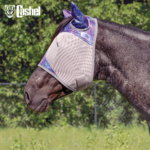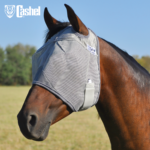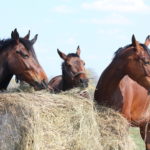Due to advances in equine nutrition, deworming, and medicine, horses now live longer and more productive lives. Many horses successfully compete well into their 20s and live to be over 30. However, the digestive efficiency and nutritional needs of horses change as they age. And, older horses fed the same as younger horses start to lose weight and condition.

In Webster?s dictionary, dilemma is defined as ?a predicament that apparently defies a satisfactory solution.? Many owners of senior horses can relate to this definition. Keeping a senior horse feeling healthy and looking good seems to be the impossible. And, this problem is fueled by the biggest myth in horse care?older horses just look bad and can’t be helped. For instance, a remark was overheard that a 36-year-old mare with a condition score of 1 (lowest possible before death) was lucky to be walking around at all at her age and nothing could be done to improve her condition. So, is there a solution? YES!
Working horses in their 20s and retired geriatric horses in their 30s can benefit from special care and feeds formulated to meet their unique needs.
Special Needs of Older Horses
Nutrition
According to Gary Kaufman, D.V.M., of Scottsdale, Arizona,1 ?Nutrition plays the single most important role in revitalizing the geriatric athlete.? The changes we see in older horses are the result of aging, wear of body tissues, and more required maintenance, especially of teeth. These changes occur on a physiological, rather than a chronological timetable, meaning they can begin in horses of various ages. The term ?geriatric? is used for horses with one or more medical conditions associated with old age. These conditions include poor dental health, pituitary or thyroid tumors, liver or kidney disfunction, poor appetite, and decreased body condition. The first step toward improved health of older horses is an evaluation of their current condition. For help with evaluating geriatric horses, refer to ?Geriatric Horses? on ADM Alliance Nutrition?s Equine Web site (www.grostrong.com).
Evaluation of Condition
After taking a medical history (including deworming and dental care), weigh the horse. Use a scale if possible, as weight tapes vary by up to 200 lb. If problems with eyes, limbs (arthritis pain often lessens appetite), or metabolic processes (such as changes in thyroid, pituitary, liver, or kidney function) that will require medication or other special care are suspected, consult an equine veterinarian (see sidebar ?Feeding Older Horses: Suggestions from Research?).

Determine body condition score. Just like younger horses, older horses should be kept at a condition score of 5 to 6 on a scale of 1-9.2 Decreased immunity, lack of appetite, and poor performance are associated with condition scores below 5. Horses with condition scores above 6 are at higher risk of digestive and musculoskeletal disorders and decreased performance.
Dental Care
Schedule an appointment with a veterinarian or equine dentist for a thorough dental exam. Poor dentition is the most common cause of loss of condition in horses of any age and is the focus of this article.
A horse’s digestive tract depends heavily on chewing of feeds to reduce particle size. Most nutrients are absorbed in the small intestine. Feeds leave the small intestine 3-6 hours after being swallowed. When poorly chewed feeds (with large particle size) pass through the small intestine, there is insufficient time for enzymes to break down the carbohydrates and proteins for absorption. Therefore, most whole grains and long-stemmed hays require considerable ?processing? via chewing prior to swallowing.
Horses? teeth grow continuously. Chewing feed wears the teeth. Because the upper dental arcade is about two inches wider than the lower arcade, the horse must chew with a side-to-side motion. Consequently, sharp points tend to form on the outer surfaces of the upper molars and the inside surfaces of the lower molars. Without regular floating (rasping), these sharp points prevent the normal chewing motion from occurring and eventually cause damage to the mouth tissues.
During the dental exam, one should check for presence and usefulness of each tooth (if a tooth is missing, its paired tooth will grow into the space). Mares should have 12 incisors (front biting teeth) and 24 molars (large grinding teeth along the jaws). Stallions and geldings usually also have four canines (nonfunctional) which are located behind the incisors, but in front of where the bit is placed.
Social Habits
Changes in social habits of older horses are also common. Older horses often give up dominance in their herds and take longer to eat, but still need companionship. They often suffer from abscesses and other dental problems that can suppress appetite to dangerous levels. Ideally, older horses should be kept in pastures adjoining other horses or pastured with companions and separated during feeding.
Conclusion
A horse with poor dentition can literally starve to death in a pasture full of lush grass. It is simply not true that old horses must be in poor health and condition. If a horse starts to lose condition, at any age, look for the cause. OLD AGE is not the cause. Find the specific problem, address it, and feed and care for the horse to meet its individual needs. Once you accept that assumption, you and your horses can look forward to many more enjoyable and productive years together.
References:
(1)Kaufman, G. Geriatric Horses: A common sense approach to care, exercise and feeding of older equine athletes, MoorMan?s Horse Feed Facts, May 1996.
(2)Henneke, D.R., G.D. Potter, J.L. Kreider and B. F. Yeates. 1983. A scoring system for comparing body condition in horses. Equine Vet. J. 15:371.
Reprinted with permission from ADM Alliance Nutrition, Inc., 1000 N 30th St, PO Box C1, Quincy, Illinois, USA 62305-3115; 800-680-8254; www.grostrong.com. Judith A. Reynolds, Ph.D., P.A.S., Dipl. A.C.A.N., is the Equine Nutritionist and Equine Product and Technical Manager for ADM Alliance Nutrition, Inc.
?





